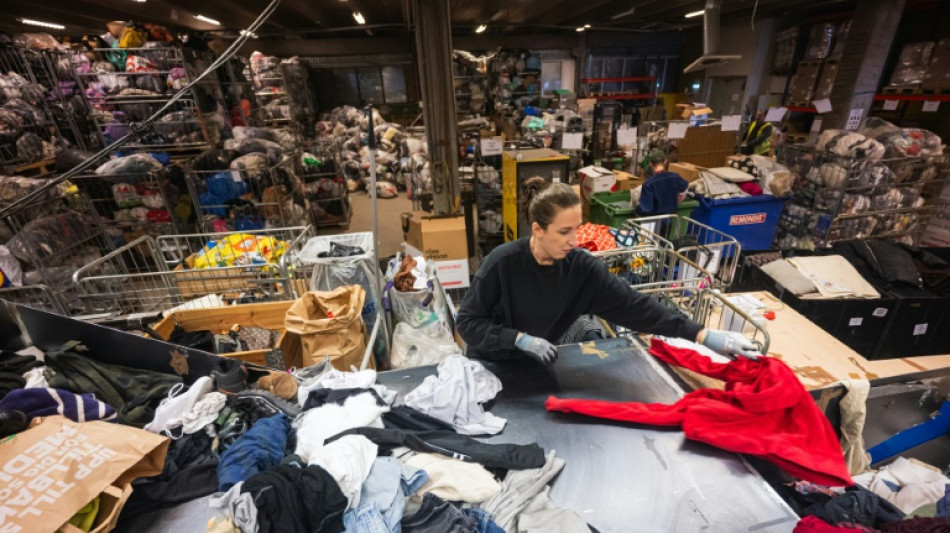
-
 Deadly monsoon rains lash Pakistan, killing dozens
Deadly monsoon rains lash Pakistan, killing dozens
-
Frank urges 'real' Spurs fans to back Tel after racist abuse

-
 Japan's emperor expresses 'deep remorse' 80 years after WWII
Japan's emperor expresses 'deep remorse' 80 years after WWII
-
Chelsea boss Maresca eager to sign new defender as Colwill cover

-
 Liverpool target Isak controls his Newcastle future: Howe
Liverpool target Isak controls his Newcastle future: Howe
-
New-look Liverpool kick off Premier League season after spending spree

-
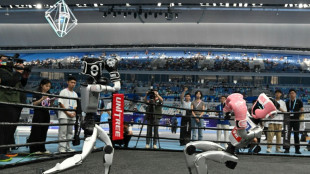 Football and falls as first humanoid robot games launch in China
Football and falls as first humanoid robot games launch in China
-
'Like hell': Indoor heat overwhelms Saudi Arabia's cooks, bakers

-
 On VJ day, king pays tribute to UK veterans, warns of war's 'true cost'
On VJ day, king pays tribute to UK veterans, warns of war's 'true cost'
-
Stocks mostly higher before US-Russia summit
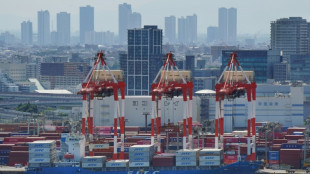
-
 Bayern's Bundesliga crown up for grabs after rocky summer
Bayern's Bundesliga crown up for grabs after rocky summer
-
Arsenal face revamped Man Utd as new-look Liverpool open Premier League season

-
 South Korea president vows to build 'military trust' with North
South Korea president vows to build 'military trust' with North
-
'Never again': Indigenous Bolivians sour on socialism
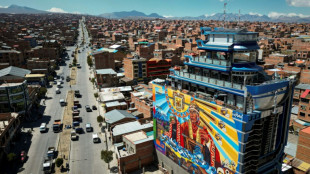
-
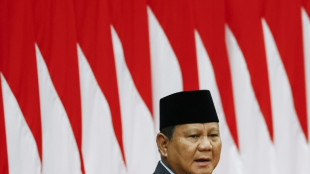 Indonesia's president touts economy, social welfare drive
Indonesia's president touts economy, social welfare drive
-
World plastic pollution treaty talks collapse with no deal
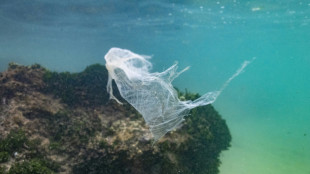
-
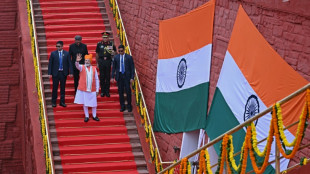 Facing US tariffs, India's Modi vows self-reliance
Facing US tariffs, India's Modi vows self-reliance
-
Trump to meet Putin in high-stakes Alaska summit

-
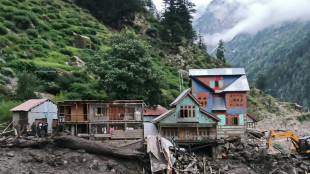 Indian rescuers scour debris after 60 killed in flood
Indian rescuers scour debris after 60 killed in flood
-
Ivory Coast village reburies relatives as rising sea engulfs cemetery
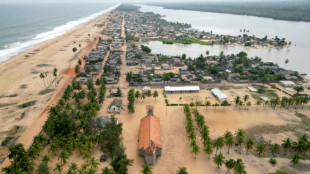
-
 Stressed UK teens seek influencers' help for exams success
Stressed UK teens seek influencers' help for exams success
-
National Guard deploys 800 personnel for DC mission, says Pentagon

-
 Japan emperor expresses 'deep remorse' 80 years after WWII
Japan emperor expresses 'deep remorse' 80 years after WWII
-
With waters at 32C, Mediterranean tropicalisation shifts into high gear
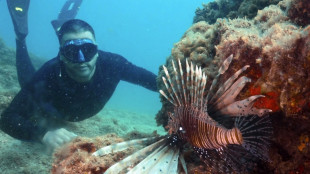
-
 Historic Swedish church being moved as giant mine casts growing shadow
Historic Swedish church being moved as giant mine casts growing shadow
-
Malawi's restless youth challenged to vote in September polls

-
 Indonesian roof tilers flex muscles to keep local industry alive
Indonesian roof tilers flex muscles to keep local industry alive
-
World's first humanoid robot games begin in China
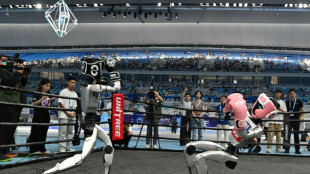
-
 Scott Barrett returns to lead All Blacks against Argentina
Scott Barrett returns to lead All Blacks against Argentina
-
Five things to know about Nigeria's oil sector

-
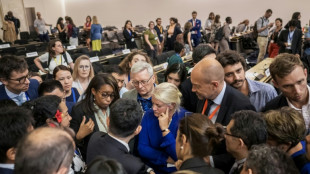 New compromise but still no deal at plastic pollution talks
New compromise but still no deal at plastic pollution talks
-
France's Cernousek seizes lead at LPGA Portland Classic

-
 Putin-Trump summit: What each side wants
Putin-Trump summit: What each side wants
-
Desperate Myanmar villagers scavenge for food as hunger bites
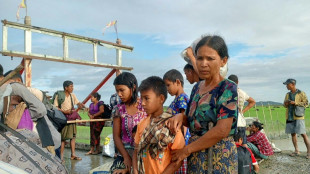
-
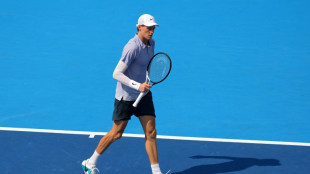 Qualifier Atmane stuns Rune to set up Sinner semi-final in Cincinnati
Qualifier Atmane stuns Rune to set up Sinner semi-final in Cincinnati
-
Hong Kong tycoon Jimmy Lai's security trial delayed over health concerns

-
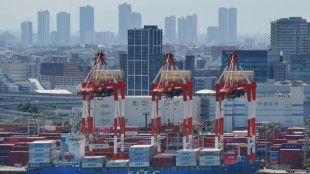 Asia stocks mixed before US-Russia summit
Asia stocks mixed before US-Russia summit
-
Putin hails North Korean troops as 'heroic' in letter to Kim
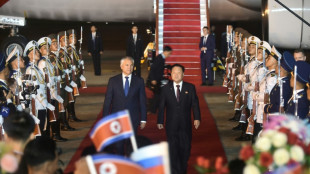
-
 Fleeing the heat, tourists explore Rome at night, underground
Fleeing the heat, tourists explore Rome at night, underground
-
Online cockfighting thrives in Philippines despite ban and murders

-
 Keeping cool with colours -- Vienna museum paints asphalt to fight heat
Keeping cool with colours -- Vienna museum paints asphalt to fight heat
-
Raising the bar: Nepal's emerging cocktail culture

-
 El Salvador plans 600 mass trials for suspected gang members
El Salvador plans 600 mass trials for suspected gang members
-
Trump's tariffs drown Brazil's fish industry
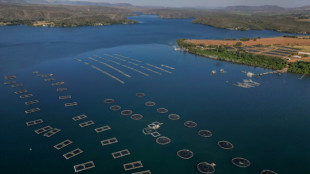
-
 Hong Kong tycoon Jimmy Lai's collusion trial resumes after delay
Hong Kong tycoon Jimmy Lai's collusion trial resumes after delay
-
Britain's Princess Anne turns 75 with typically minimal fuss

-
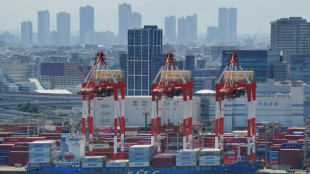 Japan posts modest growth despite US tariffs
Japan posts modest growth despite US tariffs
-
Rugby Championship kicks off amid uncertain future

-
 Israeli far-right minister backs contentious West Bank settlement plan
Israeli far-right minister backs contentious West Bank settlement plan
-
Hot putter carries MacIntyre to three-shot lead at BMW Championship


Sweden drowns in discarded fast fashion items
Sweden's recycling centres are overflowing with clothes after an EU-wide ban this year on throwing away textiles, leaving overwhelmed municipalities eager to have fast fashion giants take responsibility.
"It's a huge amount coming in everyday. It's been crazy, it's a huge increase," said Brian Kelly, secretary general of the Artikel2 charity shop in Stockholm, where rows of bins were overfilled with discarded apparel.
Since the beginning of this year, EU countries must have separate textile recycling, alongside existing processes for glass, paper and food waste.
The aim is to promote circular waste management, where textiles are sorted and reused, or recycled if they are not too damaged.
"We have seen a 60-percent increase in textiles collected in January and February this year compared with the same period last year," said Karin Sundin, an expert on textile waste at Stockholm city's waste and recycling management company Stockholm Vatten och Avfall.
Once the textiles are sorted, some 60 to 70 percent is designated for reuse, and 20 to 30 percent for recycling as padding, isolation or composite materials.
Around seven to 10 percent is burned for energy, according to the Swedish Environmental Protection Agency.
That is a huge improvement from before the new law, according to experts, who note that discarded clothing used to be systematically incinerated.
- Large volumes -
However, a lack of infrastructure in Sweden means used clothes are largely exported abroad, primarily to Lithuania, where they are sorted, reused, or burned for energy.
"We don't have the big sorting plants that can put everything into value in the same way that they have in eastern Europe for example," explained Sundin.
"The reason is that it's so labour intensive (and) costs a lot of money," she said as she gave AFP a tour of the Ostberga recycling centre in southern Stockholm.
Swedes throw away 90,000 tonnes of textiles per year, or 10 kilogrammes (22 pounds) per person, according to the Swedish Society for the Conservation of Nature.
The EU average is 19 kilogrammes, according to 2022 statistics, up from 17 in 2019, data from the European Environment Agency showed.
The clothing industry also pollutes the environment.
To make a t-shirt that weighs 135 grammes (4.76 ounces), 2,500 litres (660 gallons) of water and one kilogramme (2.2 pounds) of chemicals are needed, noted Yvonne Augustsson, advisor at the Swedish Environmental Protection Agency.
"That means greenhouse gas emissions of around two to five kilos," she said.
"In Sweden, an article of clothing is used on average 30 times. If you double this to 60 times -- which seems reasonable -- you reduce the climate impact by half," she said.
Textile sorting in Sweden is handled by municipalities, many of which have been overburdened by the quantities received since the introduction of the new law.
In the sparsely populated north, some towns, such as Kiruna, continue to incinerate textiles because they have no takers for the items.
Fast fashion giants, such as H&M and Zara, are expected to eventually play a role in handling the waste they help generate, and negotiations are ongoing at the European level to determine their responsibility.
According to a preliminary agreement EU member states reached in February, clothing giants will be responsible for the end of lifetime of the products they sell, required to pay for collection, sorting, reuse and recycling.
- Change of attitude -
The idea is to encourage fast fashion retailers to produce "clothing designed to last longer," said Augustsson.
Swedish brand H&M told AFP it welcomed moves in that direction.
Consumers also need to change their mindset.
Each person should "buy no more than five new articles of clothing per year," said Beatrice Rindevall, head of the Swedish Society for the Conservation of Nature, which regularly organises clothing swaps.
In the town of Linkoping on a sunny spring day, a clothing exchange on a student campus had racks featuring everything from a hot pink jacket with feathered sleeves to faded jeans, bags and striped t-shirts.
"People can give us clothes in good condition that they don't wear anymore (and) exchange them for something else," volunteer Eva Vollmer said.
"We focus on creating the solution so that people actually have an alternative."
F.AbuZaid--SF-PST
